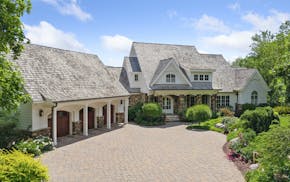Paul Williams was 6 years old in the 1960s when his mom dragged him to an anti-war protest in St. Paul's Rondo neighborhood.
Leading the parade was Joe Selvaggio, the former priest and activist who later founded the Twin Cities affordable housing nonprofit Project For Pride in Living (PPL).
Decades later, Williams would again follow Selvaggio's footsteps, this time taking the helm of Selvaggio's beloved PPL and becoming his own lion for the poor, the homeless and those craving better communities.
For 10 years, Williams has raised millions from countless corporations, philanthropists and governments to fund PPL's ventures to build or buy apartments that house homeless families and provide them support services. On average there was one groundbreaking a year during his tenure, plus the work to run job training programs, two alternative high schools and tenant services.
"All of these projects are complicated. The work of new housing development is immensely complex and hard," Williams said.
The next project for the power broker? Retirement. He will step down next month, stepping down as the more-streamlined nonprofit is seeing progress toward its goals.
Under his watch, PPL grew from 1,029 housing units in 2014 to 1,600 units in 119 buildings. Its budget grew from $34 million to nearly $60 million.
The housing units serve about 3,500 people, the schools about 120 each day, said Williams, who stepped into his PPL role after a long career with stints as St. Paul deputy mayor, grant writer and executive and managerial roles at other nonprofits and foundations.
Williams' supporters and colleagues say he sees how all the different support services need to work together to lift people, his vision coming not just from his professional experience but from growing up in the Rondo neighborhood and seeing the mental illness and homelessness suffered by a few extended family members.
"It's not enough to just put a roof over someone's head," he said. "These are my neighborhoods. I don't have to go far to figure out who it is that we're talking about. ... These are my people."
Williams and PPL's board have tapped Karla Henderson, a Detroit native and PPL's current senior vice president, to succeed him and carry on his newest challenge: selling PPL's smallest apartments to budding local landlords as a way to build wealth in the Twin Cities' communities of color and free funds so PPL can build or maintain larger housing projects.
Wilder Foundation estimates 10,500 metro residents were homeless last year. As need rises, so are post-pandemic construction and building maintenance costs.
"The cost of operating affordable housing is now far exceeding the rents that can be charged and the governmental supports that help keep that housing stable and afloat," Williams said. "Our peers are selling their bigger projects and desperately trying to get out from under projects that aren't cash flowing. That's happening across the country. It's happening in Minnesota."
Williams a product of St. Paul activism
Williams grew up in a biracial family in St. Paul in the 1960s and 70s that he said prepared him for a life that included some sort of civic service.
His mother, a white German Catholic and one of seven kids raised in Frogtown, was the chief soloist at the St. Paul Cathedral, believed in social justice, helping the homeless and regularly took Williams and his three siblings to war protests and civil rights marches. She was a force, friends said, noting that for years she helped lead the Model Cities health care nonprofit that serves 1,200 Ramsey County families.
Williams' father, Charles, the oldest of 10 children, became one of the few Black attorneys in St. Paul at the time. Charles, now 94, first served as a Ramsey County public defender and spent the last 20 years of his career as Ramsey County Family Court referee.
The Williams branch migrated to Minnesota from Topeka, Kan., in the 1920s and settled in Rondo. His grandfather founded the Hallie Q. Brown Community Center.
"They ran restaurants and stuff on University Avenue and were all very active in community," Williams said. "They weren't rich, but they were hardworking, prosperous people who cared about the community."
Williams ended up serving as deputy mayor to Chris Coleman, current head of Twin Cities Habitat for Humanity. The two become friends in second grade at St. Luke's Elementary School.
"He was a kid of color in a very white grade school. He and his cousin were one of only a handful of students of color in the school," Coleman said.
It didn't get easier around town. Local kids taunted him for walking the few blocks from his Rondo neighborhood south of University Avenue to visit a cousin on his mom's Dittberner side of the family in Frogtown, just north of University Avenue.
"It was challenging for African Americans. Facing racism on a daily basis was part of Paul's life," Coleman said. "It really shaped him. It's why he has chosen the paths he has for creating opportunity and equity for others."
As a teen Williams joined local bands. He joined the rugby team while studying at St. John's University in Collegeville and earned a master's degree from Humphrey School of Public Affairs at the University of Minnesota. He went onto work for United Way, the St. Paul Foundation and the Minneapolis Foundation, where he ran programs designed to improve neighborhoods.
The married father of two then spent 13 years managing the property developer and neighborhood revitalization group Twin Cities LISC. There he put his grant writing skills to work, while developing commercial properties, funding small businesses, coaching budding property developers and trying to transform blighted neighborhoods into safe thriving nooks.
He took LISC's formula on the road, teaching the model to communities around the country.
After 13 years of travel, with parents and children getting older, Williams took the job as Coleman's deputy mayor, running the snow removal, pot hole repairs and other daily duties for a city that then had a population of 269,000.
"Paul was the Joe DiMaggio of deputy mayors. He was calm. Didn't get rattled," Coleman said. "The first day of the job the snow started falling. By the time the day was over, there were 16 inches of snow. There is nothing more challenging to a city government than street plowing. Building CHS Stadium was nothing compared to fielding snow complaints."
And yet, Coleman said, he managed it like it was any other day in the office.
"People respected the hell out of him because he knew his stuff, wasn't afraid to ask questions and he rolled up his sleeves," he said.
Mike Temali, chief executive of St. Paul-based Build From Within Alliance and founder of Neighborhood Development Center, said Williams was always that way for the 20 years their work crossed paths. Temali and Williams co-founded the nonprofit NEON. And Temali watched as Williams co-founded the African American Leadership Forum and led at LISC, St. Paul and PPL.
In every instance, Williams "had this remarkable ability to take all of his energy, his personality and his values, which are all very community-based, very, very practical and smart, but also creative and innovative, and apply them in these totally different environments," Temali said.
When Williams joined PPL in 2014, the board's message was blunt: Don't screw up the legacy created by Selvaggio and Steve Cramer, who took over PPL in 1997.
That wouldn't be easy. By 2014, PPL had just weathered five mergers in seven years.
Restructuring and balancing the books
Williams knew he had to look at everything PPL did to make the nonprofit survive.
He kept the property development and housing efforts plus the two alternative high schools, MERC and Loring Nicollet. But he spun off two newly acquired child care centers and an after-school youth-training program to other nonprofits. And he ended PPL's charter-school authorization service and a few other noncore projects.
"It's hard enough to be in the real estate business and in the employment and training business, but we were losing money in the social enterprise," Williams said. "So we went through a strategic planning process where we said, 'What are we best at?' What we came back to was we are best at housing and [job] training."
So for 10 years, Williams met with corporate foundation heads, ushered families from shelters to apartments and worked to sustain housing in Frogtown, Midway and East St. Paul to Phillips, Whittier and north Minneapolis.
He's enjoyed watching PPL tenants become stable, grow more self assured and claim their dignity. After PPL tenants near Franklin Street and Chicago Avenue in Minneapolis complained about area drug dealers and crime, Williams brought in police and community activists to meet residents and help reclaim their neighborhood.
Williams remembers one scared, but fed-up resident and mother who discovered her voice through the process.
"She gained confidence," Williams said. "It's just not enough to put a roof over someone's head. We believe in this more holistic model. We believe in doing deeper, more comprehensive work with communities."
Responding to aftermath of George Floyd murder
PPL became a key player after George Floyd was murdered by police in 2020, and the riots that followed. Staffers calmed tenants after fending off rioters. They helped set up a command center for the St. Paul Fire Department inside one of its University Avenue complexes.
Williams "was really very influential after George Floyd and the process of recovering from the unrest in both cities and advising the business community on how to give more effectively for equity purposes," said Mike Christenson, retired Hennepin County senior policy adviser and a Humphrey School advisory council member.
"Paul played a substantial role as the head of PPL in launching projects that helped the community heal," Christenson said. "Most of us look up to him as an example of how to lead effectively in the nonprofit arena."
This summer, Williams joined Mayor Jacob Frey, Sen. Tina Smith and Wells Fargo executives as they broke ground on PPL's largest project yet: the $66 million, six-story Opportunity Crossing complex near the bulldozed former Kmart near Nicollet and Lake in Minneapolis.
PPL's 42-unit Simpson Community Shelter and Apartments is also under construction on 1st Street S.
In May, Williams, St. Paul Mayor Melvin Carter and Ramsey County Commissioner Rafael Ortega were on hand to cut yellow ribbons as PPL welcomed 60 families into the new Restoring Waters/Emma Norton apartments at the former Ford plant site in St. Paul. Nearby, 75 families moved into the Nellie Francis Court apartments.
In 2022, PPL partnered with the American Indian Community Development Corp. to open the 40-unit Anishinabe III supportive housing development.
Williams insists he will stay involved in community development efforts but from other perches.
He's already busy as a member of the Itasca Project, an adviser at the Humphrey School and as a board member of Destination Medical Center in Rochester, HealthPartners and the Federal Reserve Bank of Minneapolis. Next year, he will become chair of the Fed's Minneapolis board.
As Williams retires from PPL, he may look for one other board or advisory post where he can still serve the bigger community and stay engaged.
"Maybe the second half of next year," he said. "But first, I take a nap."

From lakeside getaways to urban oases, here are the 2025-26 Home of the Month winners
Rural Minnesota doctors find patients open to off-site gun storage as suicide prevention

Bloomington home with luxuries including multilevel pool and theater lists at $3.29M

